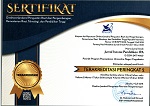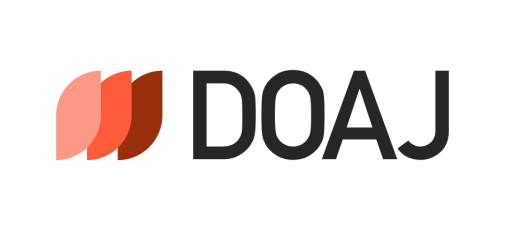Implementasi Model Pembelajaran Proyek Warga Global dalam Pembelajaran Pendidikan Kewarganegaraan
Abstract
This study aimed to analyze the planning, implementation, assessment, and characteristics of the global citizen project learning model in civic education learning. This study used qualitative research with a qualitative descriptive approach. Data collection techniques and data sources were obtained from interviews, observations, and documentation. Data analysis was carried out in three stages, namely data reduction, data presentation, and verification. The results and discussion in this article indicated that the planning of a global citizen project learning model was carried out by preparing a learning planning design that includes approaches, methods, models, media, and learning evaluations. The implementation of the global citizen project learning model was carried out with the concept of blended learning in two meetings based on the syntax of the global citizen project learning model consisting of topic determination, project design, implementation, evaluation, and publication. The assessment of the learning model of the global citizen project was carried out using observation sheets, written and oral test formats, as well as the observation sheet format for evaluating the results of global citizen project products. There are six characteristics of the global citizen project learning model in civic education learning, i.e. developing religious attitudes of faith, piety, and character; tolerance; global insight; critical, creative, and innovative thinking; collaboration and communication, and media literacy.
Keywords
Full Text:
PDFReferences
Abdul-Rahman, H., et al. (2008). Conceptual Delay Mitigation Model Using a Project Learning Approach in Practice. Construction Management and Economics, 26(1), 15-27.
Albrow, M. (1996). The Global Age: State and Society Beyond Modernity. California: Stanford University Press.
Anisimova, E. S. (2020). Digital Literacy of Future Preschool Teachers. Journal of Social Studies Education Research, 11(1), 230-253.
Balser, T. J., et al. (2017). Collaboration and Communication. New Directions for Institutional Research, 175. 65-79.
Banks, J. A. (2008). Diversity, Group Identity, and Citizenship Education in a Global Age. Educational Researcher, 37(3), 129-139.
Bohan, C. H., et al. (2017). Creating 21st Century Global Citizens: a Design-Led Systems Approach to Transformative Secondary Education for Sustainability. Journal of Digital Learning in Teacher Education, 35(4), 37-41.
Buchanan, J., Burridge, N., & Chodkiewicz, A. (2018). Maintaining Global Citizenship Education in Schools: a Challenge for Australian Educators and Schools. Australian Journal of Teacher Education, 43(4), 51-67.
Castek, J. & Dwyer, B. (2018). Think Globally, Act Locally: Teaching Climate Change Through Digital Inquiry. Reading Teacher, 71(6), 755-761.
Choo, S. S. (2017). Global Education and Its Tensions: Case Studies of Two Schools in Singapore and the United States. Asia Pacific Journal of Education, 37(4), 552-566.
Cooper, R. (2019). The Role of Dispositions in the Development of Pedagogical Knowledge for Pre-service Science Teacher Education. Asia-Pacific Journal of Teacher Education, 47(5), 508-523.
Davis, B. D. & Miller, T. R. (1996). Job Preparation for the 21st Century: a Group Project Learning Model to Teach Basic Workplace Skills. Journal of Education for Business, 72(2), 69-73.
Esen-Aygim, H. & Salim-Tasking, C. (2017). Teachers’ Views of Social-Emotional Skills and Their Perspectives on Social-Emotional Learning Programs. Journal of Education and Practice, 8(7), 205-215.
Falk, R. & Steenbergen, B. V. (1994). The Condition of Citizenship. New York: Sage Publications.
Giddans, A. (1990). The Consequence of Modernity. California: Stanford University Press.
Hrastinski, S. (2019). What Do We Mean by Blended Learning?. Tech Trends, 63(5), 564-569.
Indrijati, S., et al. (2016). Mata Pelajaran Antropologi Sekolah Menengah Atas (SMA). Jakarta: Kemdikbud.
Jenine A, K. (2020). Blended Learning: Moving Beyond the Thread Quality of Blended Learning and Instructor Experiences. Journal of Educators Online, 17(2), 1-18.
Karaali, G. (2011). An Evaluative Calculus Project: Applying Bloom’s Taxonomy to the Calculus Classroom. Primus, 21(8), 719-731.
Kemendikbud RI. (2016). Permendikbud Nomor 22 Tahun 2016 tentang Standar Proses Pendidikan Dasar dan Menengah.
Kemendikbud RI. (2016). Permendikbud Nomor 23 Tahun 2016 tentang Standar Penilaian.
Kemendikbud RI. (2019). Surat Edaran Nomor 14 Tahun 2019 tentang Penyederhanaan Rencana Pelaksanaan Pembelajaran.
Kim, B. J., Kavanaugh, A. L., & Hult, K. M. (2011). Civic Engagement and Internet Use in Local Governance: Hierarchical Linear Models for Understanding The Role of Local Community Groups. Administration & Society, 44(7), 807-835.
Kleinig, J. (2018). Trust and Critical Thinking. Educational Philosophy and Theory, 50(2), 133-143.
Komalasari, K. (2014). Pembelajaran Kontekstual Konsep dan Aplikasi. Bandung: Refika Aditama.
Lee, H., et al. (2013). Socioscientific Issues as a Vehicle for Promoting Character and Values for Global Citizens. International Journal of Science Education, 35(12), 2079-2113.
McCall, A. L. (2017). Teaching Children about the Global Economy: Integrating Inquiry with Human Rights. The Social Studies, 108(4), 136-142.
Murdiono, M. (2014). Pendidikan Kewarganegaraan untuk Membangun Wawasan Global Warga Negara Muda. Jurnal Cakrawala Pendidikan, 3(3), 349-357.
Nurhadi, N. & Lubis, Z. B. (2019). The Concept of Tauhid Education Value (Aqidah) in National Education System Perspective. AL-ISHLAH: Jurnal Pendidikan, 11(2), 141-146.
PSMA Ditjen Pendidikan Dasar dan Menengah. (2017). Direktorat Pembinaan Sekolah Menengah Atas Direktorat Jenderal Pendidikan Menengah Kementerian Pendidikan dan Kebudayaan.
Rasmikayati, E. & Djuwendah, E. (2015). Dampak Perubahan Iklim terhadap Perilaku dan Pendapatan Petani (The Impact of Climate Change to Farmers’ Behavior and Revenue). Jurnal Manusia Dan Lingkungan, 22(3), 372-379.
Republik Indonesia. (2017). Peraturan Pemerintah Nomor 87 Tahun 2017 tentang Penguatan Pendidikan Karakter (PPK).
Ritzer & Barry. (2014). Handbook Teori Sosial. Bandung: Nusa Media. Diterjemahkan dari karya George Ritzer dan Barry Smart (ed). New York: Sage Publications.
Samuel, P. H. (2004). Benturan Antar Peradaban dan Masa Depan Politik Dunia. Yogyakarta: CV. Qalam.
Sarabhai, K. V. (2013). ESD and Global Citizenship Education. Journal of Education for Sustainable Development, 7(2), 137-139.
Schou, J. & Hjelholt, M. (2018). Digital Citizenship and Neoliberalization: Governing Digital Citizens in Denmark. Citizenship Studies, 22(5), 507-522.
Sigauke, A. T. (2011). Citizenship and Citizenship Education: A Critical Discourse Analysis of the Zimbabwe Presidential Commission Report. Education, Citizenship, and Social Justice, 6(1), 69-86.
Syukri. (2019). Upaya Penyelesaian Konflik Politik di Indonesia. Jurnal Al-Harakah, 2(2), 33-46.
Tokan, M. K. & Imakulata, M. M. (2019). The Effect of Motivation and Learning Behaviour on Student Achievement. South African Journal of Education, 39(1), 1-8.
UNESCO. (2015). Global Citizenship Education: Topics and Learning Objectives. United Nations Educational, Scientific and Cultural Organization.
Urhaidah, M. I. M. (2015). Pembaharuan dalam Pemanfaatan Hasil-Hasil Teknologi. Jurnal Pesona Dasar, 3(3), 1-14.
Williams, T. (2003). Learning from Projects. Journal of the Operational Research Society, 54(5), 443-451.
Wittayakhom, N. & Piriyasurawong, P. (2020). Learning Management STEAM Model on Massive Open Online Courses Using Augmented Reality to Enhance Creativity and Innovation. Higher Education Studies, 10(4), 44-53.
Zahabioun, S., et al. (2013). Global Citizenship Education and Its Implications for Curriculum Goals at the Age of Globalization. International Education Studies, 6(1), 195-206.
DOI: http://dx.doi.org/10.17977/um019v6i1p155-164
Refbacks
- There are currently no refbacks.
Copyright (c) 2021 Jurnal Ilmiah Pendidikan Pancasila dan Kewarganegaraan

This work is licensed under a Creative Commons Attribution 4.0 International License.
View My Stats











